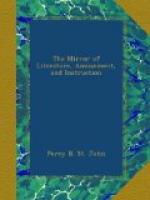In the year 1437, an obscure man, Nicola di Rienzi, conceived the project of restoring Rome, then in degradation and wretchedness, not only to good order, but even to her ancient greatness. He had received an education beyond his birth, and nourished his mind with the study of the best writers. After many harangues to the people, which the nobility, blinded by their self-confidence, did not attempt to repress, Rienzi suddenly excited an insurrection, and obtained complete success. He was placed at the head of a new government, with the title of Tribune, and with almost unlimited power. The first effects of this revolution were wonderful. All the nobles submitted, though with great reluctance; the roads were cleared of robbers; tranquillity was restored at home; some severe examples of justice intimidated offenders; and the tribune was regarded by all the people as the destined restorer of Rome and Italy. Most of the Italian republics, and some of the princes, sent embassadors, and seemed to recognise pretensions which were tolerably ostentatious. The King of Hungary and Queen of Naples submitted their quarrel to the arbitration of Rienzi, who did not, however, undertake to decide it. But this sudden exaltation intoxicated his understanding, and exhibited feelings entirely incompatible with his elevated condition. If Rienzi had lived in our own age, his talents, which were really great, would have found their proper orbit, for his character was one not unusual among literary politicians; a combination of knowledge, eloquence, and enthusiasm for ideal excellence, with vanity, inexperience of mankind, unsteadiness, and physical timidity. As these latter qualities became conspicuous, they eclipsed his virtues, and caused his benefits to be forgotten: he was compelled to abdicate his government, and retire into exile. After several years, some of which he passed in the prison of Avignon, Rienzi was brought back to Rome, with the title of senator, and under the command of the legate. It was supposed that the Romans, who had returned to their habits of insubordination, would gladly submit to their favourite tribune. And this proved the case for a few months; but after that time they ceased altogether to respect a man who so little respected himself in accepting a station where he could no longer be free, and Rienzi was killed in a sedition.
“The doors of the capitol,” says Gibbon, “were destroyed with axes and with fire; and while the senator attempted to escape in a plebeian garb, he was dragged to the platform of his palace, the fatal scene of his judgments and executions;” and after enduring the protracted tortures of suspense and insult, he was pierced with a thousand daggers, amidst the execrations of the people.
At Rome is still shown a curious old brick dwelling, distinguished by the appellation of “The House of Pilate,” but known to be the house of Rienzi. It is exactly such as would please the known taste of the Roman tribune, being composed of heterogeneous scraps of ancient marble, patched up with barbarous brick pilasters of his own age; affording an apt exemplification of his own character, in which piecemeal fragments of Roman virtue, and attachment to feudal state—abstract love of liberty, and practice of tyranny—formed as incongruous a compound.




